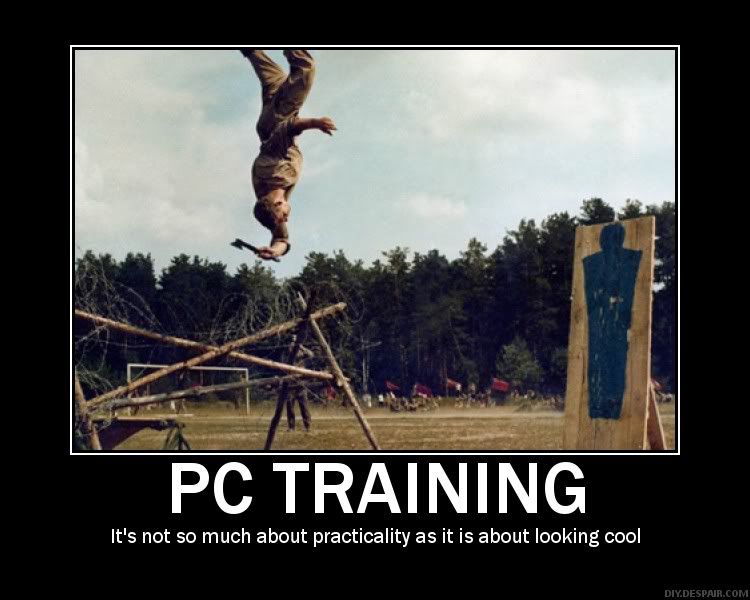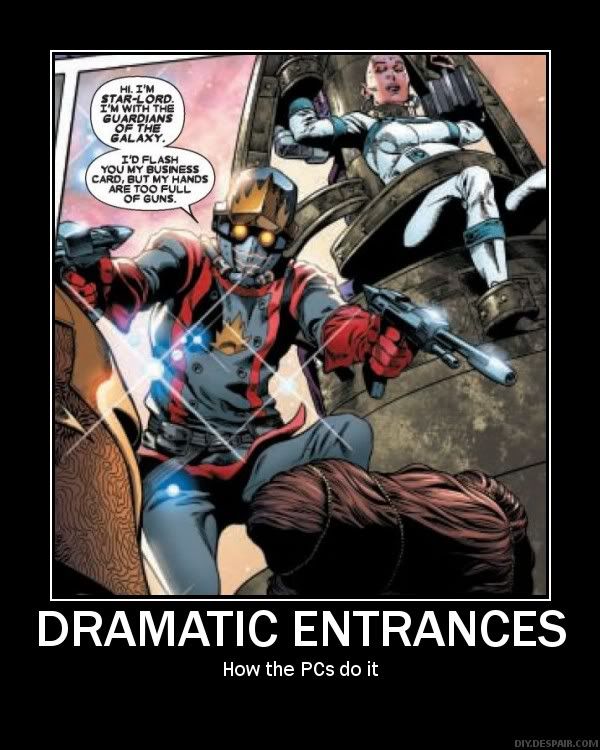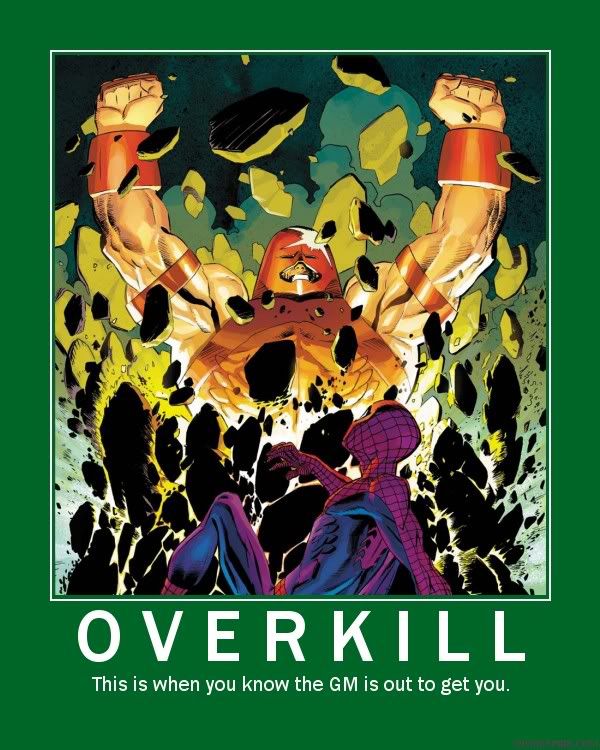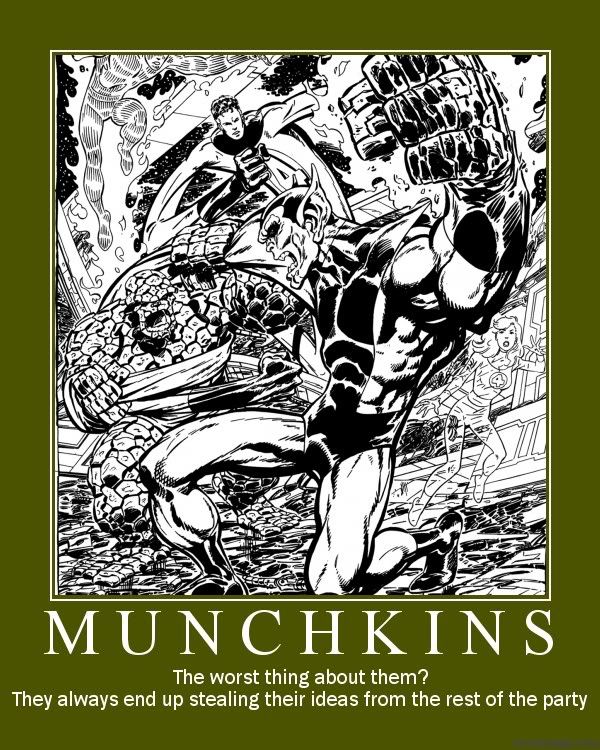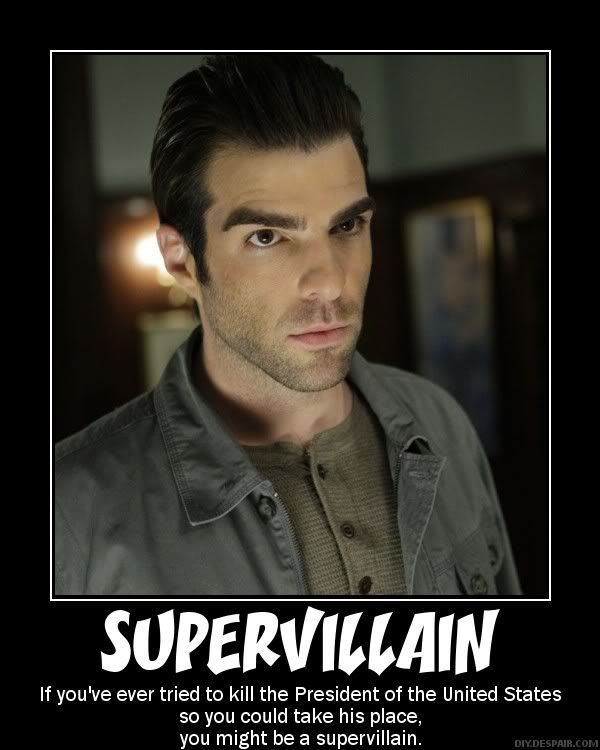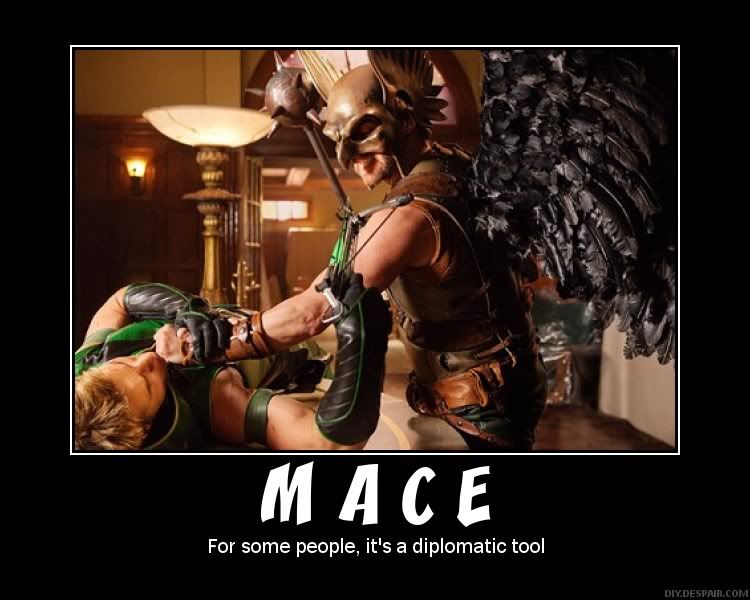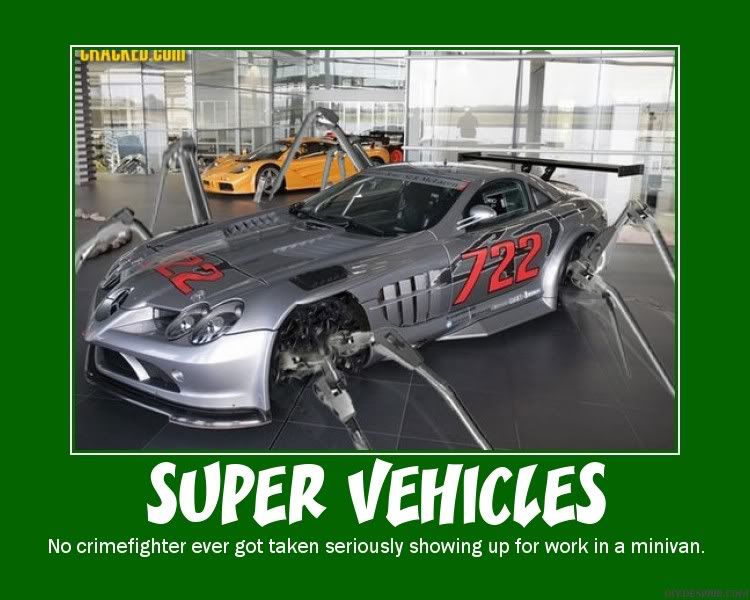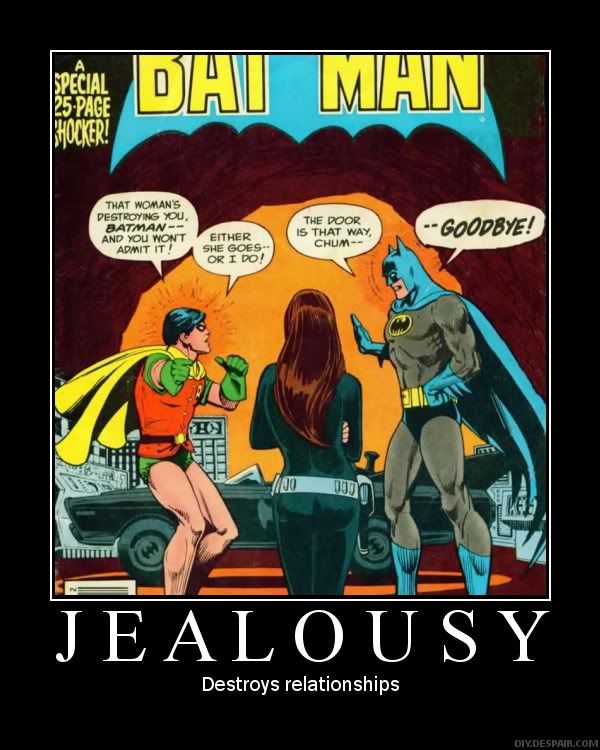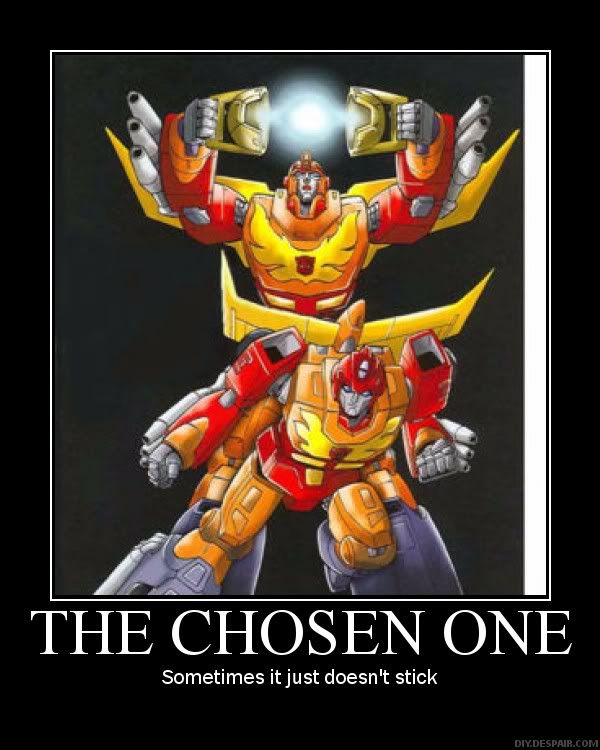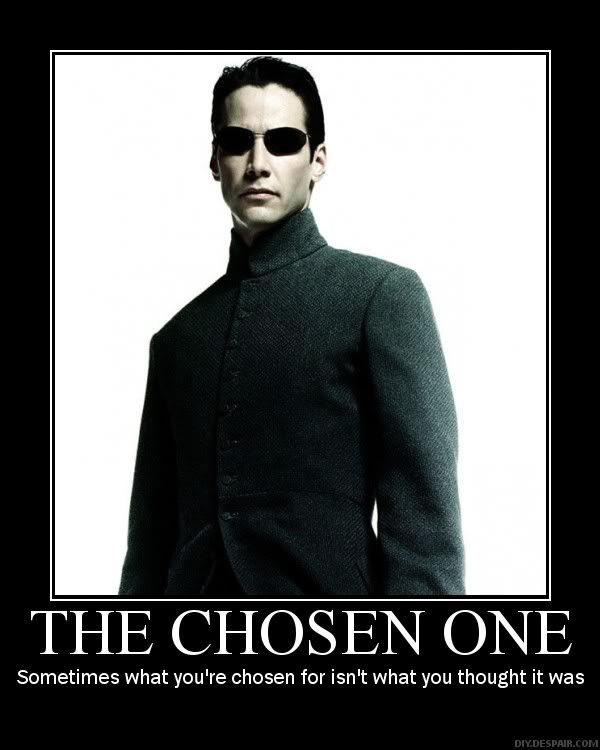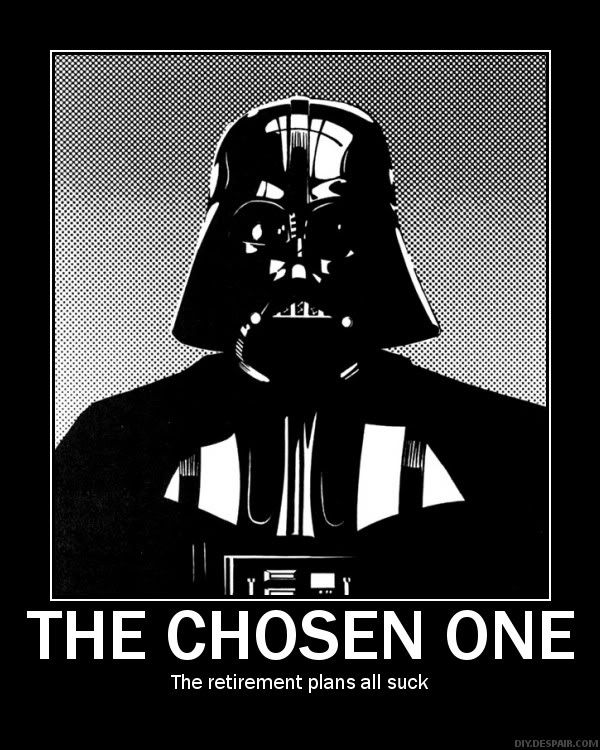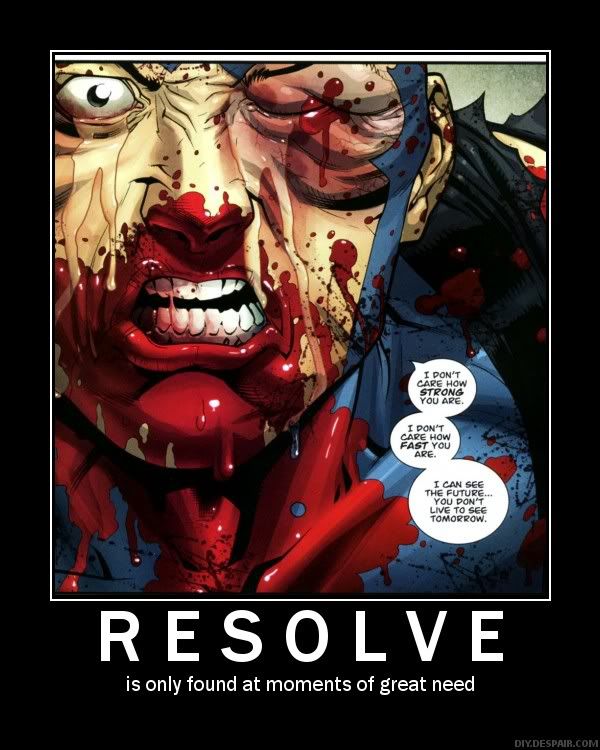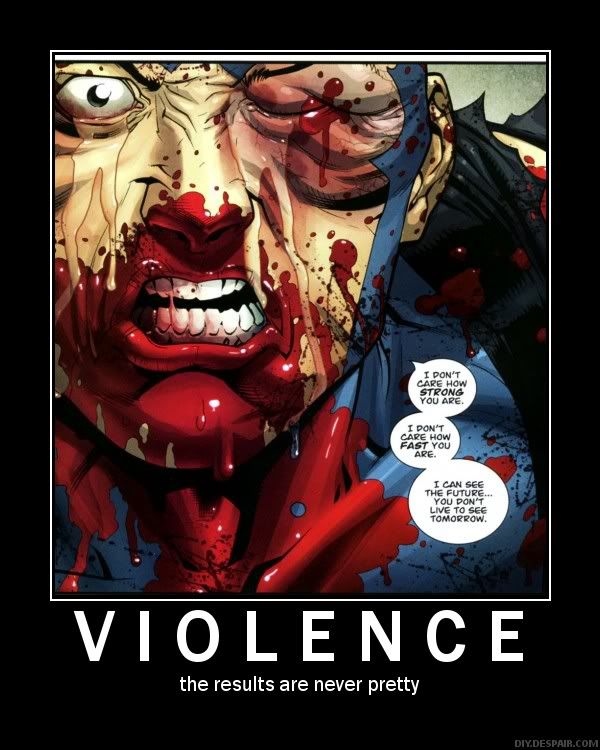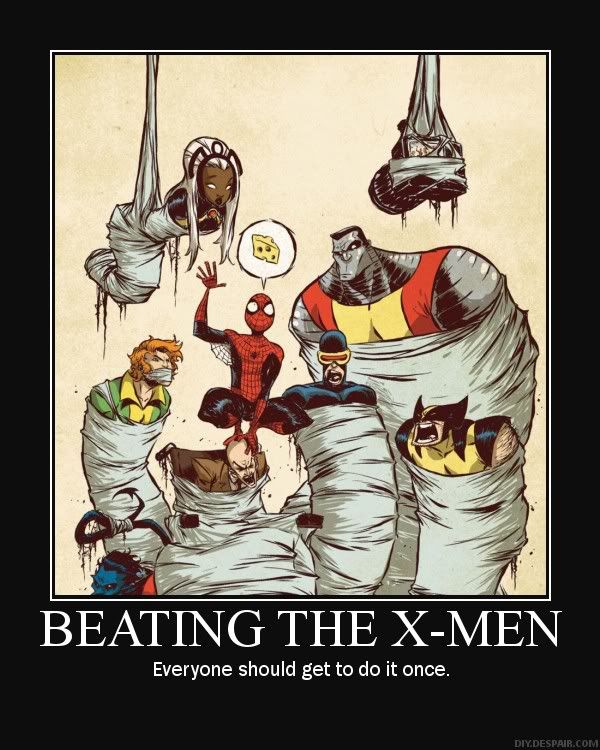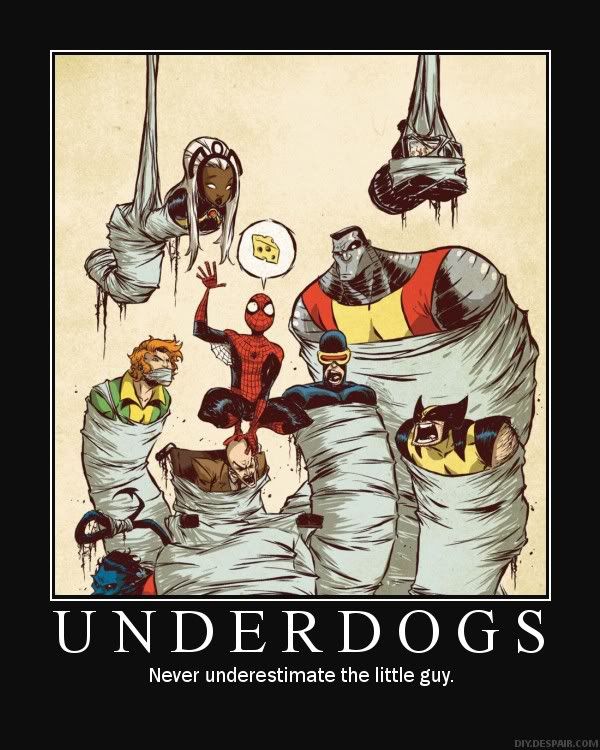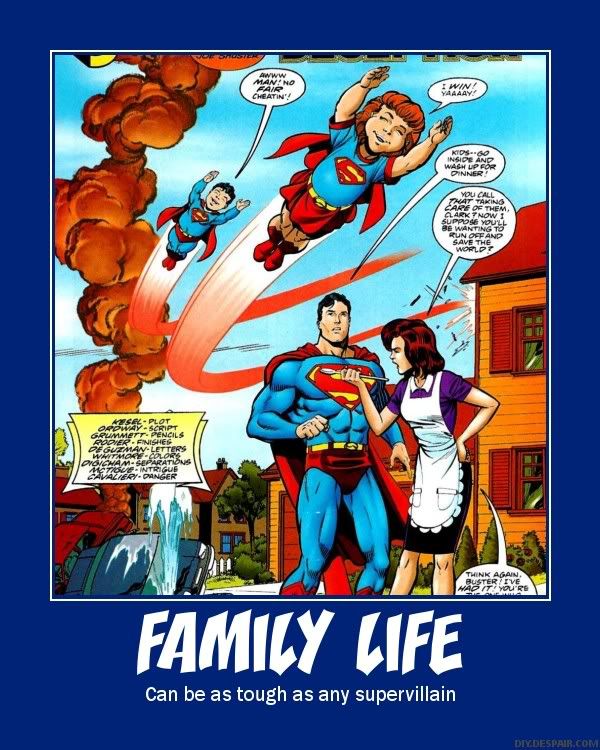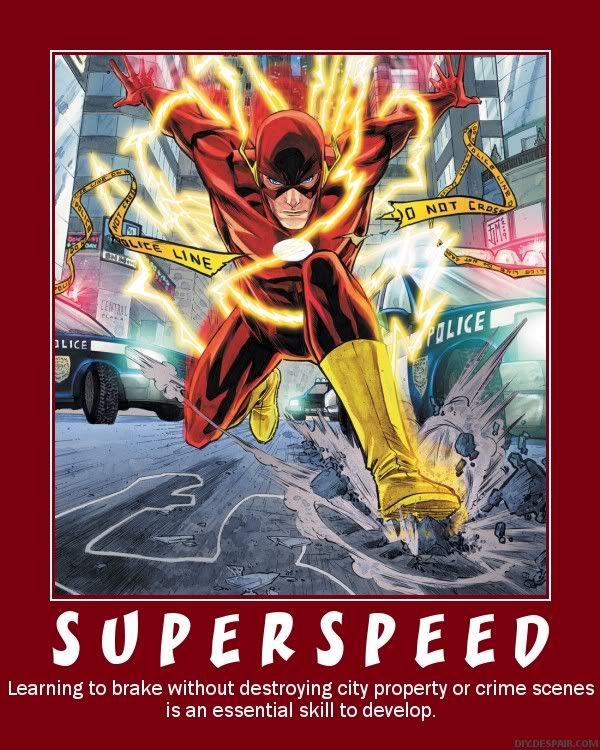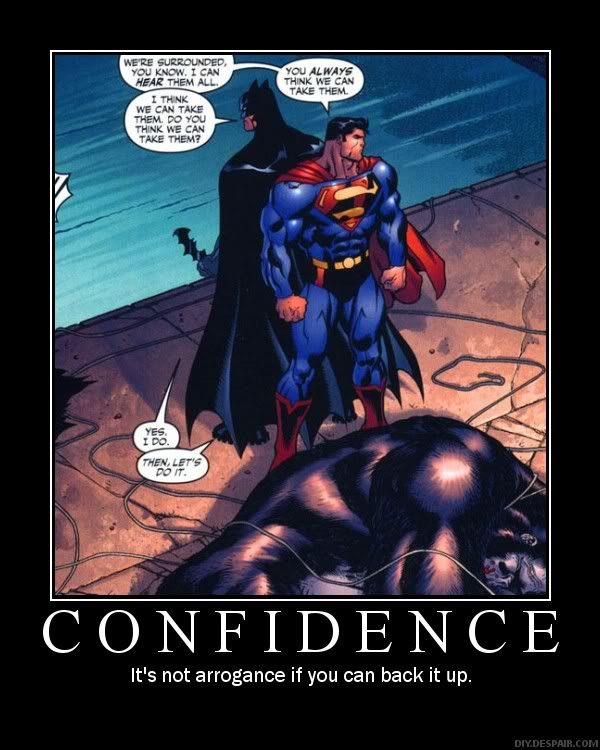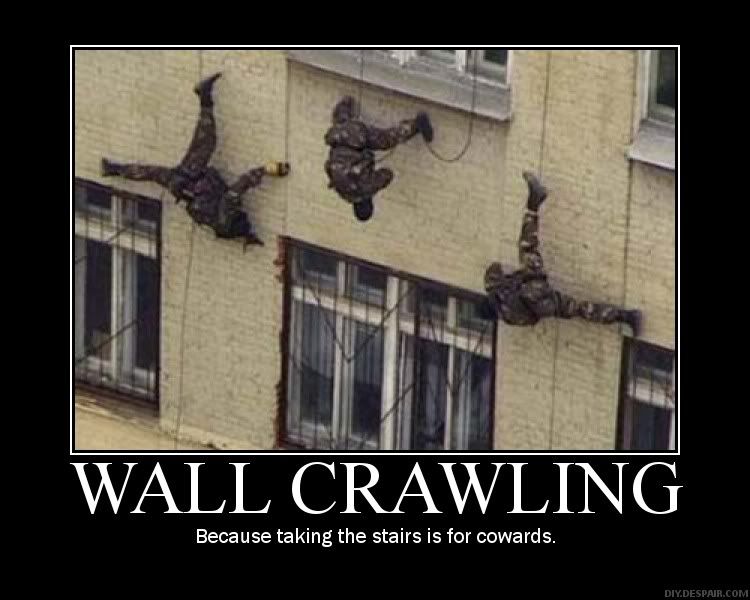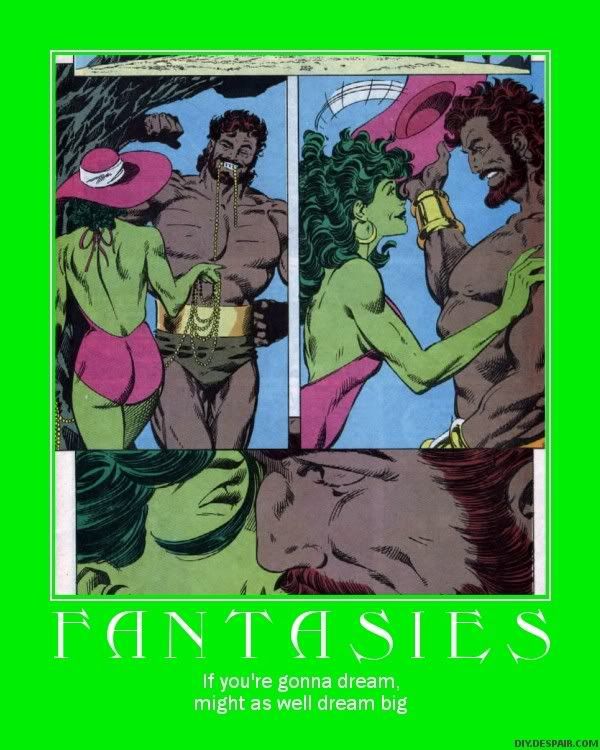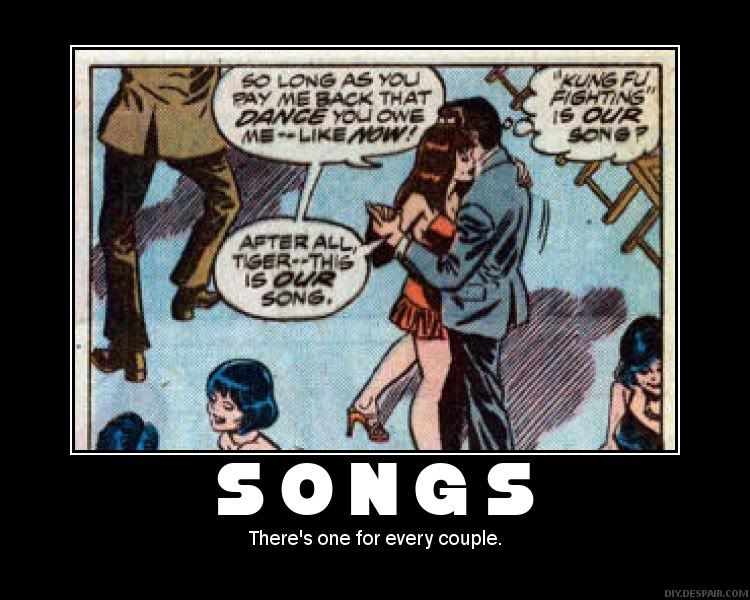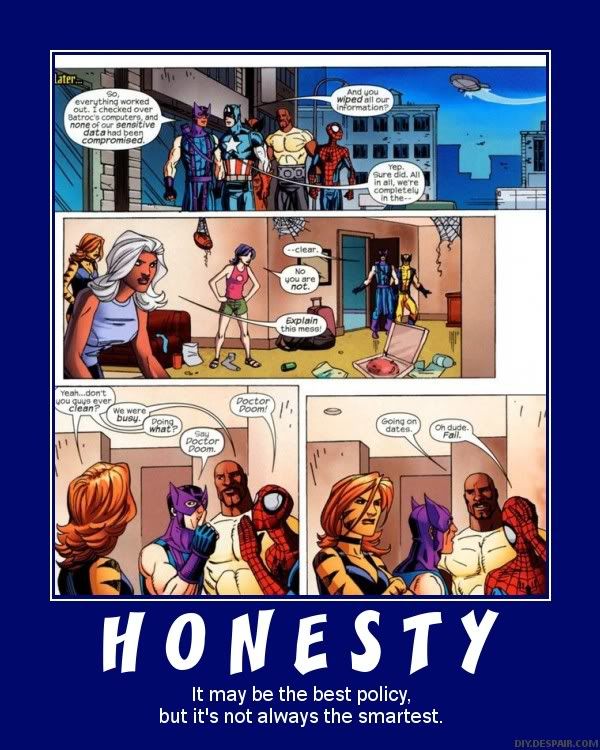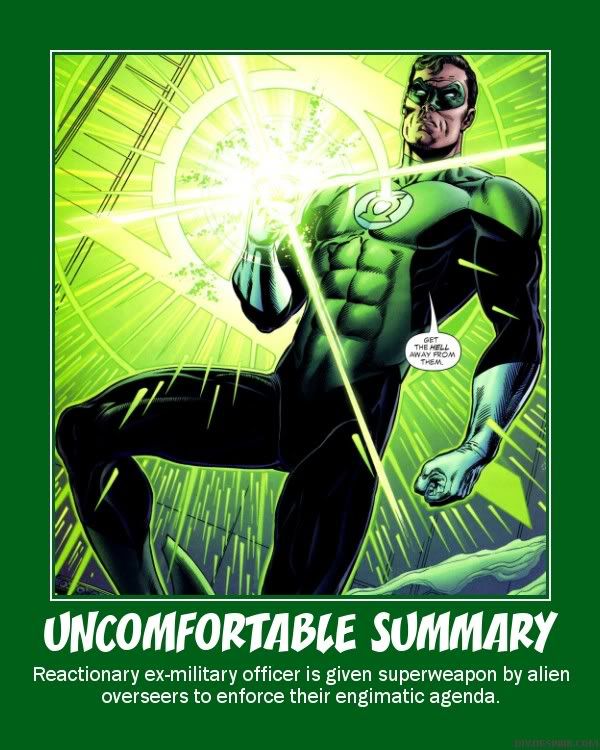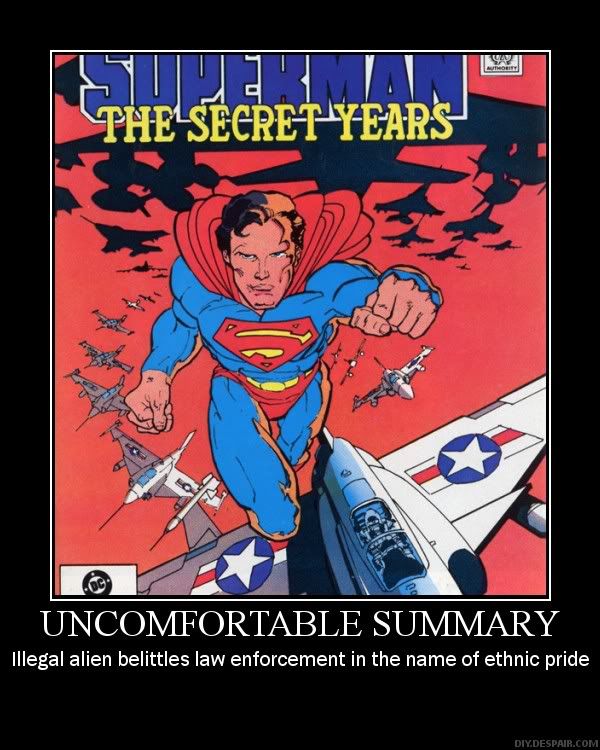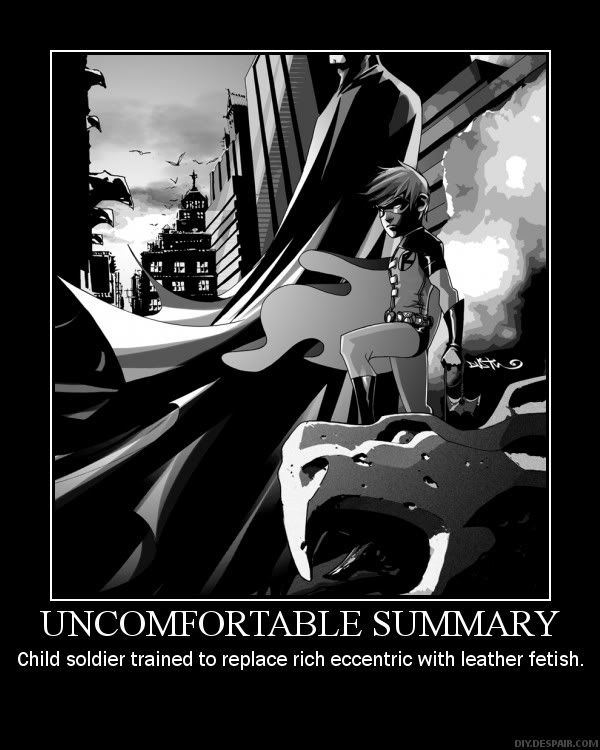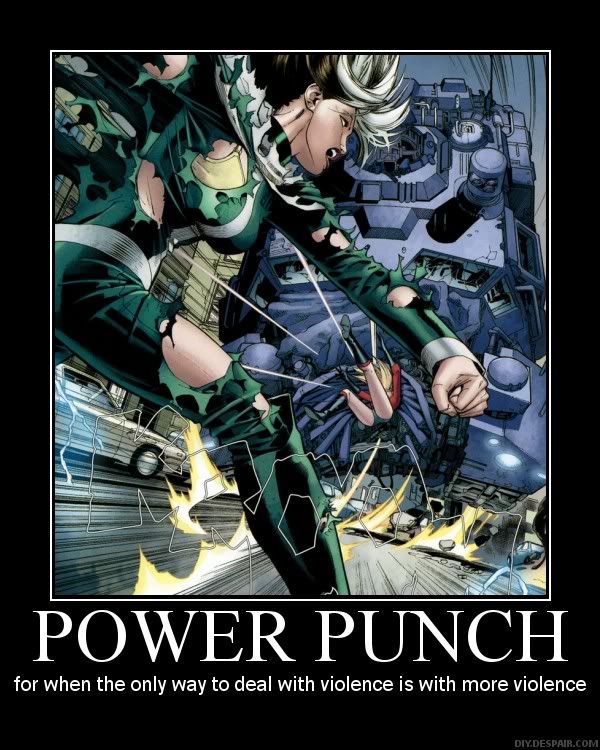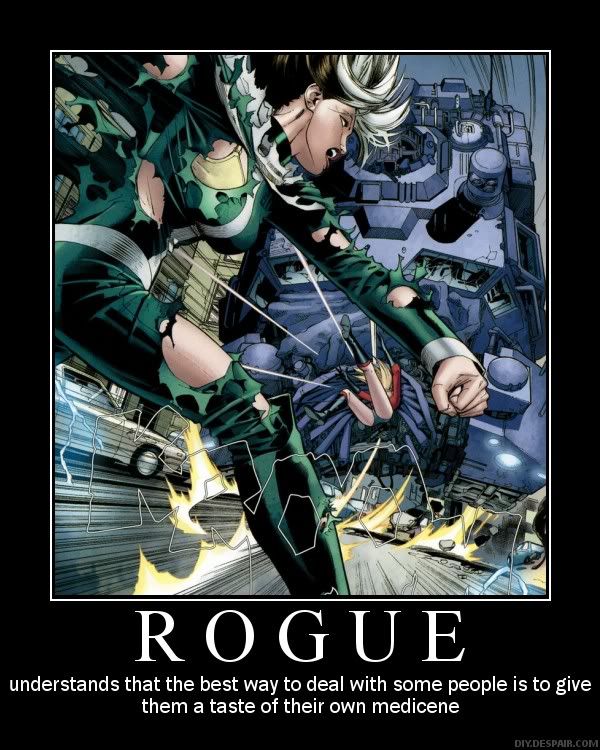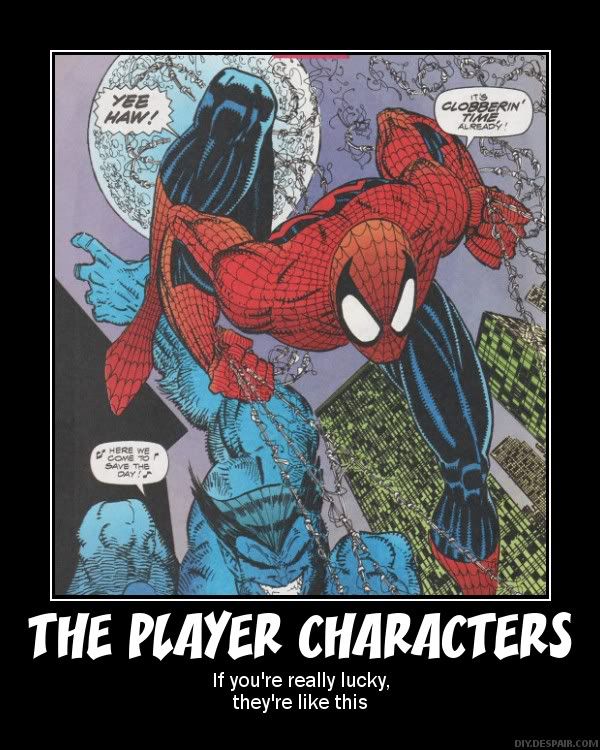
Your one-stop shop for comics-related fake motivational posters. Also, other things.
Sunday, February 28, 2010
Saturday, February 27, 2010
Heroes vs. Smallville - FIGHT!

Haven't talked about either of these in a good long time (and as you can see by my recycling the Sylar poster below, I don't have much left in the way of Heroes-based posters) so I'm going to just ramble on for a bit.
So, who here figured it would come down to this after 5 years? That Heroes is barely clinging to life, with a very mixed season at best, and a lot of moves that come off more as desperate grabs for attention, is a surprise in and of itself. However, coupled with Smallville, which just seems to keep going and going despite having long since snapped the cables on the suspension bridge of disbelief, is astounding. As you can guess, I have a few thoughts about why this has happened, and what it says about each show.
Now, the first thing we have to note is the rather large difference in approach. Smallville follows the traditional format of a genre show - a series of episodic adventures with a few sub-plot arcs that transition to the main story over time, while Heroes follows the currently popular method best known on Lost of Mega-arcs that play out over long timescales, with very little in the way of status quo. This difference manifests itself in pacing: Smallville gets away with little beats in every single episode (i.e. there's one story beat about Lois and Clark, one about Clark and Chloe, one with Green Arrow and another character, one about Clark coming to terms with what he has to do, a beat resolving the villain of the espisode). Heroes? Has maybe three beats total per episode, if that. So while you might, might get the long term payoff in Heroes if you stick around long enough, you get lots of little payoffs in an episode of Smallville - more bang per hour of watching, if you'll buy that metaphor.
One of the story beats in particular is essential (in my opinion at least) to a superhero story regardless of medium is crime-fighting and saving lives. Smallville has radically improved in this regard over the last couple years with depictions of Clark regularly saving people other than his supporting cast (Lois, Chloe, etc.) and starting to deal with criminals who aren't just the bad guys of the individual story arc. Contrasted with Heroes, which usually offers a total of one "Big Bad" villain per arc, and usually 2 or 3 flunky villains tops for a whole 10-20 episodes. Also, outside of Hiro performing a random rescue or two and Peter Petrelli's stint this season as Super-Paramedic, you don't see a lot of these so-called "Heroes" helping people who aren't integral to the plot. Chew on that for a bit and see how it affects the message of the show.
Now, let's talk about the big moves both shows have made, whether out of a genuine desire to shake things up, or a last mad dash to avoid cancellation. With Heroes, several prominent cast members have been jettisoned (or had their character arcs reduced to virtually nothing), and a major revelation has changed their world forever. In addition to this, the audience is now being asked to suspend disbelief enough to buy Sylar's attempt at redemption. Now, I can't fault the Heroes writers for this; Zachary Quinto is arguably the biggest draw of the cast, and they need a reason to keep him around that doesn't make other characters look even more pathetic for not dispatching the show's biggest villain for the past four years. But it is a big stretch to buy for a series that tries very hard to want to take the idea of superheroes in a real-world context seriously.
Smallville, on the other hand, has ditched reality to embrace the fantasy of the DCU, integrating more and more of the spectacle that the 70+ years of DCU publishing history has to offer, and the results have been a mix of great (Zatanna) and laugh-out-loud silly (Hawkman's cosutme is just terrible, and Stargirl's is worse). One imagines that the writers just decided that there was no way to make this realistic without making it drab (or being accused of stealing ideas from Heroes) and just decided to take full advantage of the cameo opportunities.
So, when we contrast Heroes, with it's long-game plan, and dedication to trying to keep to realistic ramifications, and Smallville's episodic comic-bookiness, where do you stand? For me, as bad as some of the elements can be (Clark - just put on the tights already) I have to stand with Smallville on this one.
Labels:
Heroes,
motivational posters,
Smallville. Superman
Friday, February 26, 2010
Checking Up
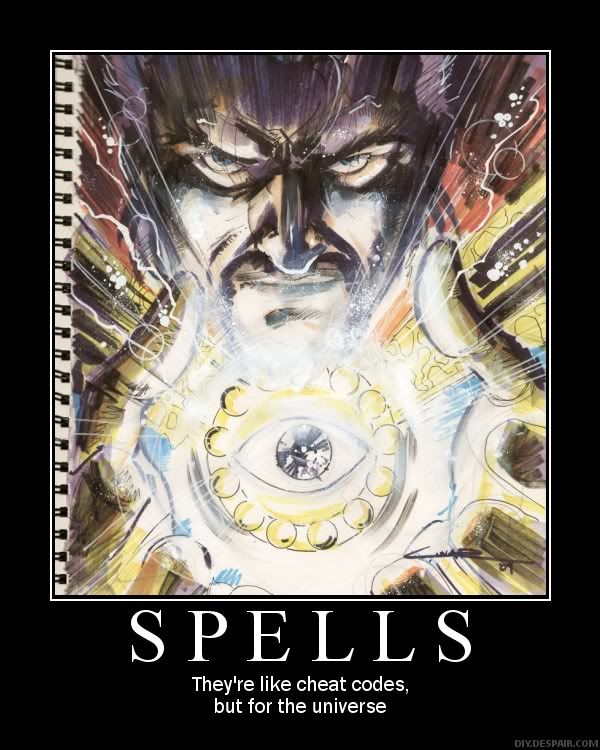
It's been about a week since the changes in Blogger. I haven't seen any problems, but if you are, please try and let me know somehow. Also, I understand more changes are coming this way and I have no idea what they mean or if I should do something about it. If you know more, again, please get in touch.
Labels:
Because I care,
Dr. Strange,
motivational posters
Thursday, February 25, 2010
Wednesday, February 24, 2010
Tuesday, February 23, 2010
Plot Devices that Need to Go Away #9
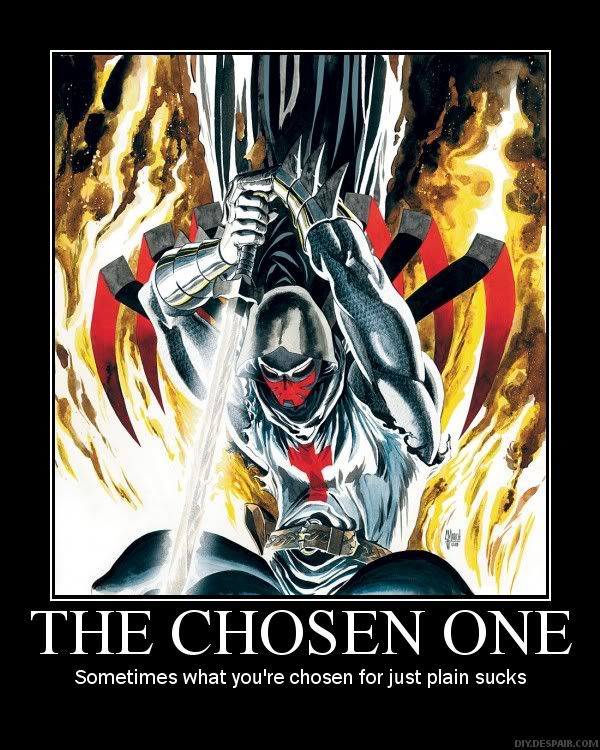
Haven't done one of these in a long time, but I did remember that someone asked for it, so here you go. Finally.....
Plot Devices that Need to Go Away #9
THE CHOSEN ONE
Also Known As: Actually, I'm pretty sure that's it, right?
What is it?
There's a prophecy, and a chosen one who is meant to fulfill it. It is usually integral to the plot.
Why Do Comic Companies Do It?
Because almost all mass media genre fiction uses it. Comics aren't a much greater offender than the rest of fiction generally. It's a simple mechanic for getting some bit of plot resolved by the end of the story.
Recent Offenders include but are not limited to:
Hope Summers, Cable (Nathan Summers), Batwoman, Buffy Summers (man, the Summers name comes up a lot, doesn't it?), Hal Jordan, Sodam Yat, Adam Warlock, Harry Potter, and the various characters depicted in these posters.
This one goes back to the dawn of fiction and the idea that a special hero who will save the people by sheer dint of his specialness, so it's hard to really pin the wrap on any one character in particular.
Why does it have to go away?
Because there is a difference between succeeding because you are special and succeeding because you're good, and that's a distinction that not a lot of writers are taking the time to make anymore. Our fiction is being saddled with an increasing number of increasingly defective characters that we are supposed to believe are the protoganists are "Special" and often triumph over their obstacles for no other reason than they are special, as oppossed to the fact that they are either skilled, or resourceful, or believe in themselves. Superman isn't the hero because he has powers - it's because he has these powers and never relents in using them for others, that he never stops. Spider-Man is the hero because more than any other character, he uses his wits and determination to come out on top. And so on.
Angles for Redemption of the Device? Let's have heroes who aren't just special: they're GOOD.
And that's the last of these I've got, unless people want to write in some suggestions.
Monday, February 22, 2010
Superpowers, Violence, and Invincible
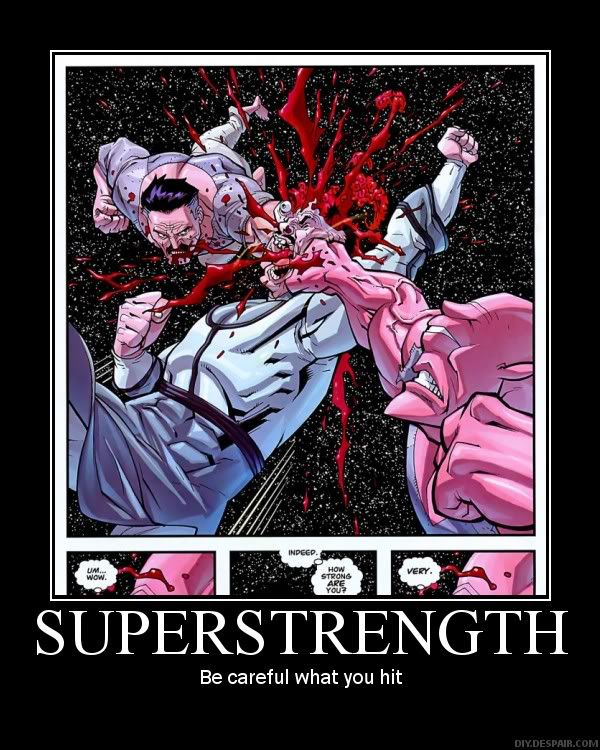
I don't normally talk much about Invincible. It's a perfectly good comic at doing what it does and that's great, but it only rarely blips on my radar. The book does have a reputation however as having an extreme amount of blood and gore when depicting superpowered battles, leading to the idea that Kirkman's being puerile or sensationalistic about it. However, it is my belief that the Invincible creative team understands full well the intersection of superpowers and violence and offers a subversive take on them.
First, let's consider the traditional Strong/Invulnerable superhero archtype. The question that is not often asked is "Wait, how do they know how to _____?" Particularly with invulnerability, that would require taking some rather extreme risks in what amounts to a personal test to destruction. Of yourself. In most superhero stories, the discovery of that power is via some accidental means - hit by a car or shot with bullets, etc. If that didn't happen, how would they know? Would they try running into traffic or shooting themselves? Lighting themselves on fire? Spending a night in a meat locker to see if they could resist the cold? You see where this is going. And the real bitch of invulnerability in a superhero universe is that it's a limited invulnerability; someone who is strong enough can hurt you, if they hit hard enough.
On the flip side, how would our hero know how hard to hit someone as to not kill them? How would you practice that skillset except to have some rather brave test subjects (whom one would hope, have Wolverine-level regenerative capabilities, just in case)? This is subject to almost all superpowers - learning how to use them for non-lethal combat would likely be a process of trial and error that the audience is thankfully asked to ignore. And when these superhumans face other superhuman opponents, how do they know to dial it up a knotch to deal with superhumanly durability or invulnerability without leading to lethal results?
Another interesting aspect of the level of violence in Invincible is the ramifications as depicted. Rarely if ever do you see the witty or hardass one-liners after an opponent is taken down the way you do with Wolverine and that ilk (The Viltrumites are the exception. They are also a race of ultraviolent sociopaths, so I think we can let that slide). More often, the characters who survive are badly beaten and require extensive recuperation. More interesting (and more rare for the realm of supercomics) are the psychological ramifications of having to deal with lost friends and family, and the hardening of the spirit that comes with the increasing level of violence. The current arc in has been indirectly implying that with all the violence Invincible has encountered, something like superhuman Post-Traumatic Stress Disorder would be an issue of some great concern for both him as well as those that could be hurt by him.
So there you have it - yes, Invincible is gorey, and it is brutal, but in a way that helps to enlighten the issue of violence, superhuman and otherwise.
Labels:
Image Comics,
Invincible,
motivational posters,
Rants
Sunday, February 21, 2010
Saturday, February 20, 2010
X-Men = Child Soldiers?

That is the question I put before you all today in this later than usual post.
Now, yes, it is true that a lot of these critiques can be applied to any underage superhero (e.g. Robin) and yes, of course it's not an intentional thing on the part of the writers. It's also true that the teen/young sidekick hero has lasted since the Golden Age as a staple of the genre. Fine, so be it. I'm still taking a look at it and I'm curious what you think.
First, how do we define a child soldier? It's a controversial subject with a fair degree of leeway, but to use a general description;
-Under 18
-Organized into a military structure and hierarchy such that they are NEVER viewed as a superior to any adult.
-Radicalized into a specific doctrine.
Now, let's apply this to Xavier's original class, pictured below.
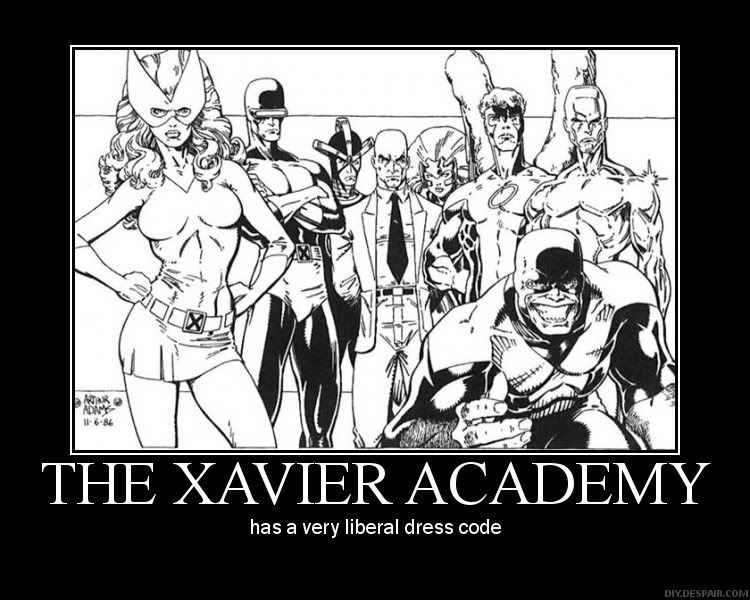
While continuity nuts may haggle on this one, I'm going to discount Hank McCoy (Beast) from this list as while his age varies depending on the depiction, he's generally been portrayed as the eldest of the first class by some years, so saying he was likely 18 years of age is not much of a stretch. For the rest of the team, and particularly Cyclops, the definition applies. From other iterations, I would also include Kitty Pryde, Rogue, Jubilee and every single New Mutants/New X-Men/X-teens/Generation X member.
Now, what makes the "child soldier" label stick to the X-Men in my mind is that of a specific ideological bent - that of mutant co-habitation, enforced by a group of militants (The X-Men). No matter the (real or imagined) nobility of Charles Xavier and his cause, he made a very dubious moral compromise when he recruits these teens - he is bringing them into a conflict that they are (from a legal standpoint) not capable of making an informed decision on. Consider this: in many of the recruitment stories of these individual young X-Men, from Cyclops and Iceman, to Rogue, to many of the individual New Mutants, they are recruited after an incident of anti-mutant paranoia or some other factional conflict. In effect, they are recruited at a moment of weakness and in a state of fear, trauma or shock. Rarely if ever is there an intelligent argument made by another adult advocate for rejecting the option offered by Xavier or to act in any other way. If this were a government military doing this recruitment, there would be no question that a immoral act of coercion was being applied to a minor. While there is the minor caveat that many of the X-Men have the option of returning to normal lives, in reality after they have been identified with that faction they remain with it out of fear of reprisal from the group's many foes.
What does this mean? Well, for one, it means that "The Ends Justify the Means" is a label that should rightfully be applied to Xavier as well as Magneto, and it makes the moral grounding of the X-Universe and the mutant struggle that much more murky. It also means that most of the X-Men, recruited when they were younger, could be considered the subject of brainwashing and would need to be subjected to intense therapy. I would think this would be the case with Scott Summers, after being recruited at age fifteen after a traumatic encounter with anti-mutant hysteria. He even took on Xavier as a surrogate father and completely adopted the ideology at the expense of any semblance of any other life, but that's completely understandable; he was never given another choice.

Friday, February 19, 2010
And the Strangeness continues
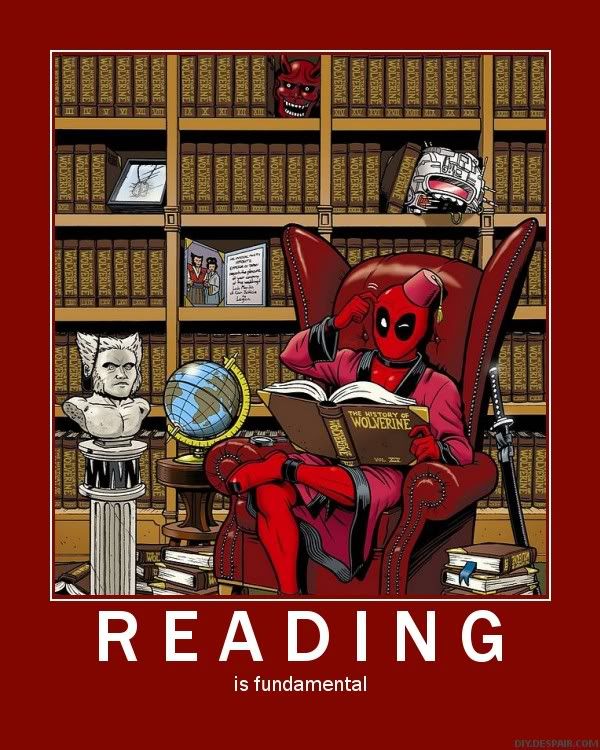
I admit, the comic blogosphere feels a little less fun now that Caleb and Chris Sims are cutting back on their weekly comic reviews. I really do wish them the best. At the same time, I'm going to miss getting their biting commentary on the week's releases. Any recommendations?
Labels:
Comics,
Deadpool,
Fellow Bloggers,
motivational posters
Thursday, February 18, 2010
Wednesday, February 17, 2010
Tuesday, February 16, 2010
Monday, February 15, 2010
Sunday, February 14, 2010
Comic Couples: No introduction Required

You know what? Just read any of my other rants on this subject, it's pretty well covered there.
However, the short version.
Mary Jane is:
-compatible with Peter because they've both had to make difficult choices about responsibility, they both have a biting and wicked sense of humor, and they even so much as have some common interests.
-a character in her own right, and not just support
-someone who uses her 'fun' persona to mask her own problems and insecurities
-aware of what Peter does and that he does it not out of some obsession with trying to fix the past or atonement.
Peter:
-sees a woman who is so many things at once and balances them all in a way that takes so much effort for him
-doesn't have one tenth of the ability to be as comfortable in his own skin as Mary Jane does
-knows that Mary Jane is the stronger one because of all this, and inspires him to try to do better
Done for now.
Labels:
Mary Jane,
motivational posters,
Rants,
Spider-Man
Saturday, February 13, 2010
Comic Couples: Lois and Clark
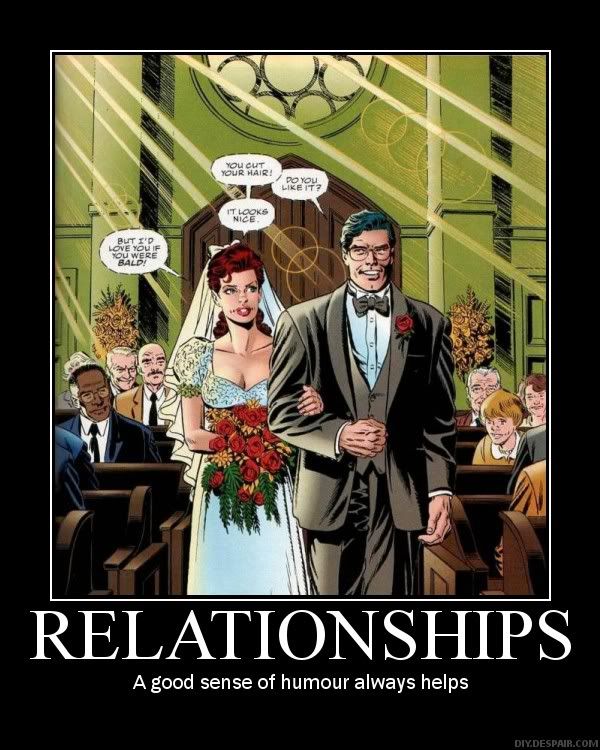
Almost anything I could write here would be redundant given the length of this relationship in pop culture, but just a couple things;
1) People who think disolving the triangle and marrying them was a bad move? Yeah, you're wrong - the triangle was only good at one thing, and that's showing that Lois was smarter than 99.9999999% of the DC population (including Lex Luthor) for even suspecting that Clark was Superman. Otherwise, it's a complete waste of time and an insult to the characters.
2) The stories that show how and why the marriage works? Good stuff, but in short; Clark has 900 different super senses and superspeed, and Lois is still the better reporter, and she genuinely to her core believes in truth and justice, against overwhelming odds. Lois, on the other hand, has never or will never see a man who's more driven to the goal of helping level the playing field between the powerful and the powerless. That's what she sees, beyond the powers is a man who will live (and if need be, die) to set the example for others to follow.
Labels:
Lois Lane,
motivational posters,
Rants,
Superman
Friday, February 12, 2010
Comic Couples: Scott and Barda
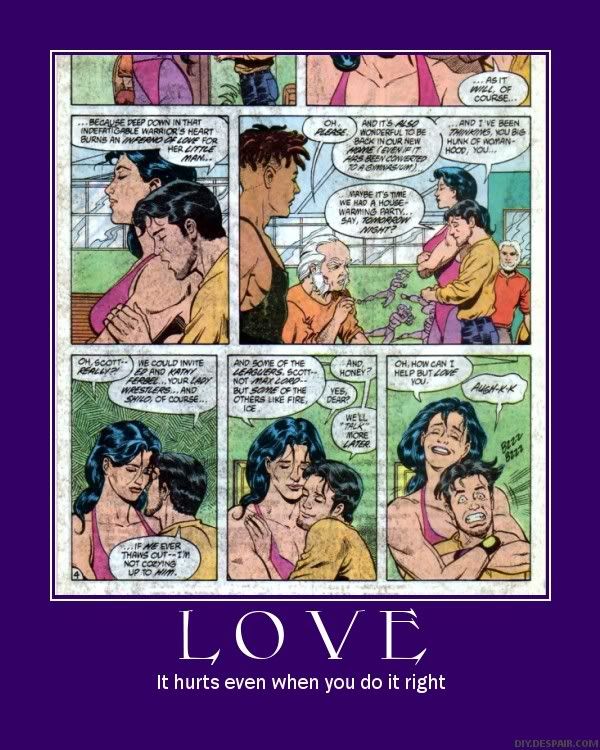
This is a relationship that I think should be impossible for any competent comic writer to do wrong. It's a classic story of star-crossed lovers, and how they each make each other better.
Now, I know what you're thinking - "Wait, but isn't that onesided? After all, Scott turned Barda free of the Furies, what did she do to improve him?"
And the answer is simple: the fact that Scott realized that he was even capable of love while being raised on APOKALIPS was part of what elevated him to escape it. If you get that, then you get Barda's contribution. Now granted that's a little circular and it runs the risk of making Barda a trophy or prize, but I argue that her display of sheer resoluteness inspired his own. His own mind gave him the way to escape, but she showed him how to get the will to do it.
Now, before I put up the final two couples, I'm going to address a couple of obvious criticisms:
1) Why only Big Two comic couples? I recently went over some of the non-Big Two comics I liked just recently, and hey, Love and Capes is great. Can't say enough about it, and I'll probably say more over time, so...yeah, that's my reasoning.
2) Why are there no non-hetero comic couples on the list? This is a valid criticism in my mind, and I apologize profusely. The reason I couldn't is twofold; most non-hetero comic couples haven't gotten a lot of attention (with the possible exception of Apollo and Midnighter) so there aren't a lot of good images for me to posterize. The other problem is that with the limited exposure they've had, there haven't been a lot of good stories ABOUT said relationships. But I happen to like the Phyla-Vell/Moondragon romance in Guardians of the Galaxy quite a bit, it just hasn't produced a good image for me to make.
Labels:
Barda,
Mister Miracle,
motivational posters,
Rants
Thursday, February 11, 2010
Wednesday, February 10, 2010
Comic Couples: T'Challa and Ororo
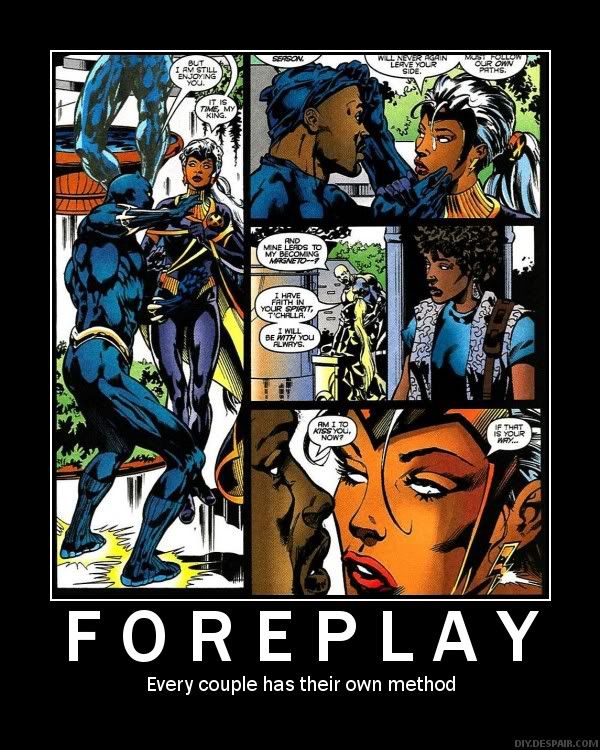
See this here? That's a couple with some serious gravitas.
As far as the marriage goes, I'm not against it in theory; but the execution in the comics was...lacking.
The two of them? Yeah, they're a power couple in every sense of the world: Storm is more naturally charismatic than T'Challa, while the Panther's intellect, a match for any in the Marvel Universe, gives him a lot of weight. The only problem in this relationship is that they are both so used to having sole control that they would be reluctant to surrender even a piece of it to any other human being.
But maybe that's what makes their relationship work; that they have the level of trust with each other to surrender control.
Just a thought.
Labels:
Black Panther,
motivational posters,
Rants,
Storm
Tuesday, February 09, 2010
Comic Couples: Wally and Linda
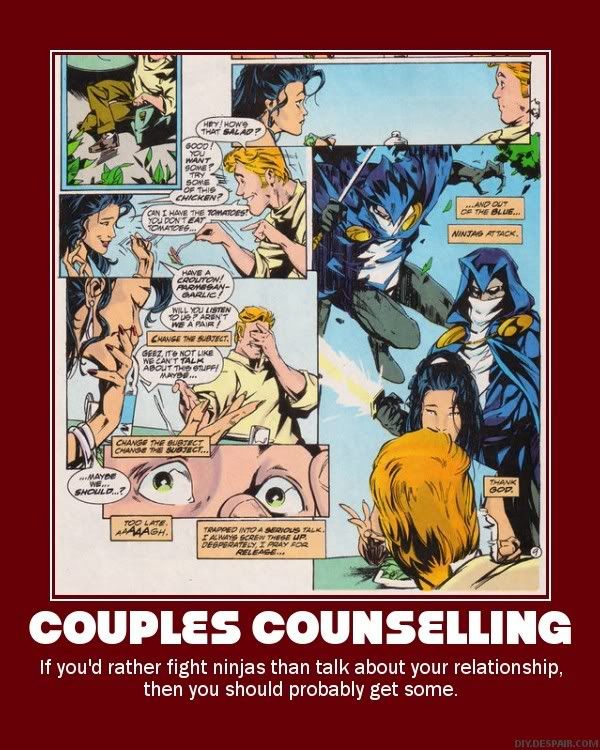
Confession: I was totally sucked in by Mark Waid's depiction of Linda Lake and Wally West during his initial run on the Flash in the 90s.
I don't know what it was - if it was just that point in my life, or Waid just was in the right place in the right time in depicting a couple with just the right level of melodrama but without the overwrought Claremontian angsting of say, Scott Summers and Jean Grey over in the X-books, or if it was just that the development of the relationship helped to cement the arc of Wally West's maturation into a more likeable character. Whatever it was, this relationship worked and was unusually mature for its time. Actually, its unusually mature for now, given the way comic writers seem to be increasingly fixated on restoring the overwrought melodrama of the Silver Age, and I include Waid himself in this group.
What made Wally and Linda work? For me, it's that rather than the hero's love interest viewing the heroic career as an excessive burden or as the sole justification for the relationship, instead viewed it as just another aspect of the relationship. Wally being a superhero was a job to Linda, a dangerous one, but one that he knew Wally, as a responsible adult, understood the risks of. That is still startling progressive thinking for the superhero genre. Pity it's not done more.
(SPECIAL POST NOTE: - uhm, the things that are happening with Blogger? What are they and how do they work and am I effected? Seriously I've got no clue and some insight would be helpful)
Labels:
Flash,
Help Please,
motivational posters,
Rants
Monday, February 08, 2010
Comic Couples: Hal and Carol
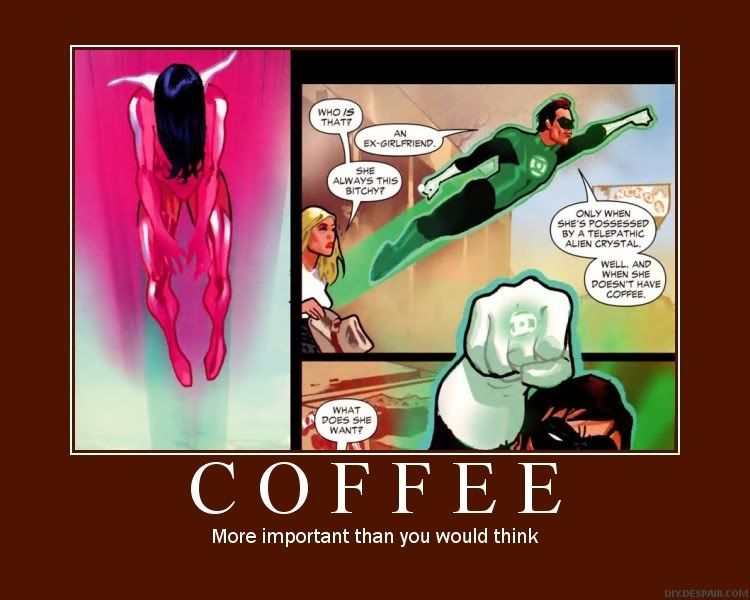 Because it's that time of year and everyone and their brother will be talking about this that and the other superhero couple, I might as well join in by giving you a week of overviewing a few comic couples and saying what there is to say about them.
Because it's that time of year and everyone and their brother will be talking about this that and the other superhero couple, I might as well join in by giving you a week of overviewing a few comic couples and saying what there is to say about them.Tonight we'll be talking about Hal Jordan (Green Lantern) and Carol Ferris (Star Sapphire), which is almost an anti-couple in their portrayal over the years and encapsulates some of the worst aspects of comic couples over the years.
First, we have the duplication of not one, but TWO sets of comic couple tropes: In the original GL incarnation, we had the "Triangle with two people" of GL/Carol/Hal Jordan, duplicating the Superman/Lois/Clark of the Silver Age Superman stories, and then we had the "my love is a villain!" that came with GL/Star Sapphire, which comes close to impinging on Batman/Catwoman.
And even with all this, they still had a problem - NO ONE CARED if they got together or not.
They tried everything to make Hal/Carol work, including doing some daring things for the Silver Age, like the hero telling his love interest his dual identity (thus collapsing the triangle), they complicated Hal's life, they made Carol out to be a full person (well, sorta - they just kept piling on new and different gimmicks onto both of them). And it sidesteps this very important point - you need to make the audience care about Hal and Carol as characters first before you care about whether or not they work as a couple.
So, that's a dismal start, but I think we'll find better as the week goes on.
Sunday, February 07, 2010
Saturday, February 06, 2010
Friday, February 05, 2010
WARNING: COMMENTARY!
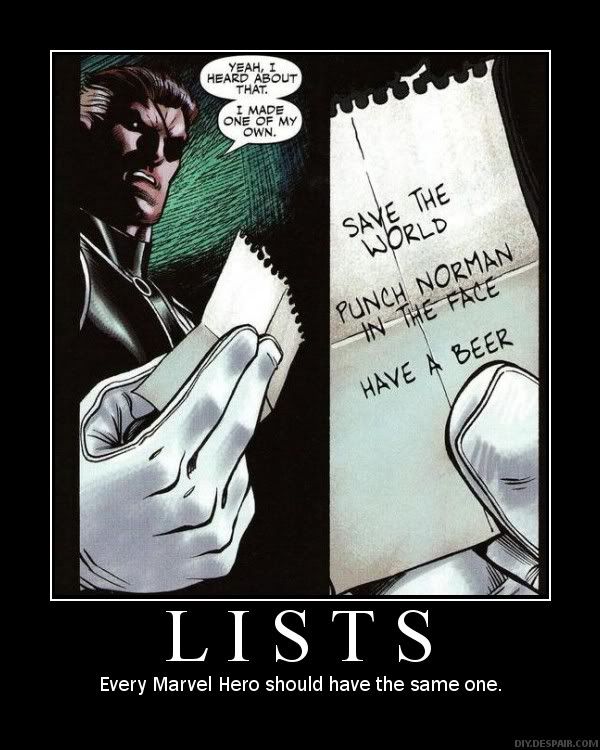
QUESTION: Do I really think things are really going to change with the newly announced more "optimistic and bright" directions from Marvel and DC given all the creators are still the same?
ANSWER: No, but it doesn't matter because it's going to change anyway, for reasons I'm about to explain.
Now, on the simply practical matter I don't think some of the writers currently employed by the Big Two Corporate Comic franchises have any other setting than grim and gritty. I'm hard pressed to imagine Brian Bendis' new Avengers title is going to be any different from any of his other efforts. He's not going to turn into Kurt Busiek or anything. But that really does not make a lick of difference at this point because he, and most of the current Marvel regime, are hanging on to their jobs by a thread.
Every morning Joe Quesada steps into the office is another day in the longest Marvel EIC run ever recorded.
Remember when Kurt Busiek left the Avengers book because with Mark Millar's Ultimates coming out, he didn't want to be considered "the old guard"? Well, Bendis has now been with the Avengers franchise almost twice as long as Busiek.
The current regime? THEY ARE THE OLD GUARD THAT THEY CAME IN TO REPLACE.
It is inevitable. If you think differently, ask Tom DeFalco or John Byrne or...you get the idea.
It is inevitable. If you think differently, ask Tom DeFalco or John Byrne or...you get the idea.
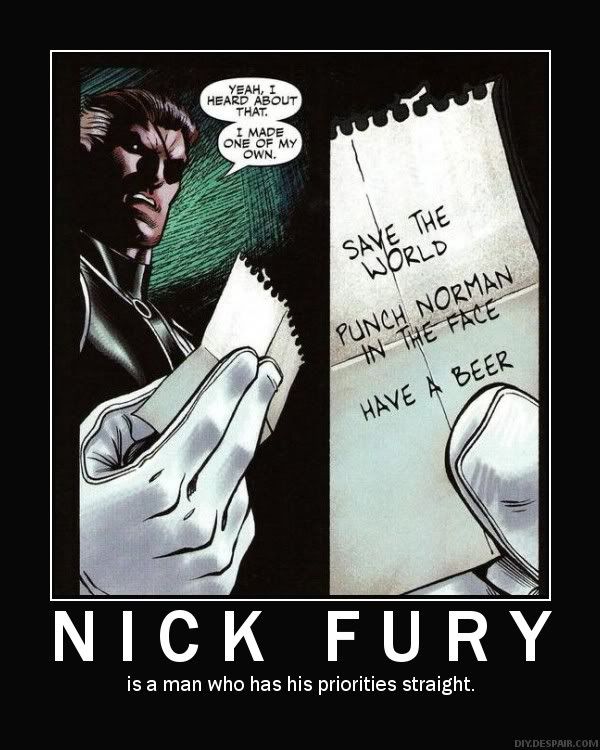
Now, how are they going to be replaced? A few possibilities exist. In a more traditional time, what would likely happen is new blood coming up through the ranks. You can almost see this happening right now with the Avengers relaunch coming right on the heels of the Marvel Adventures relaunches. Now, while there's likely no way that Marvel Adventures is going to outsell Avengers, not all things are equal. All Paul Tobin has to do is exceed the very low expectations of the MA sales base, and he can claim a big win, whereas Bendis has to maintain his high sales on the Avengers books to keep his reputation intact. Bendis has already had some serious sales troubles with big shake-ups and restarts with Ultimate Spider-Man, and there's every reason to believe that things might no go well for him. That's an example you can apply line-wide at both companies where a small increase at a book with no expectations can yield some high results.
Another traditional alternative is that the higher end management of the corporate giants that control these companies simply start rotating in teams to manage their properties from other arms of their respective media empires. A sausage factory approach where the suits move the talent to whatever part of the company they think merits the attention. A method guaranteed to bring in a level of mediocrity and result in the adaptation of the old school "House Style" of comic creation, but not an impossible result.
The final method is that of outside recruitment from independent outlets, comics and otherwise. In the last decade, this took the form of a lot of TV and movie writer talent migrating to comics for a quick stint before going back. However, given that the corporate demands will be higher in this new world, I suspect that another realm might be poached for its talent; the internet.
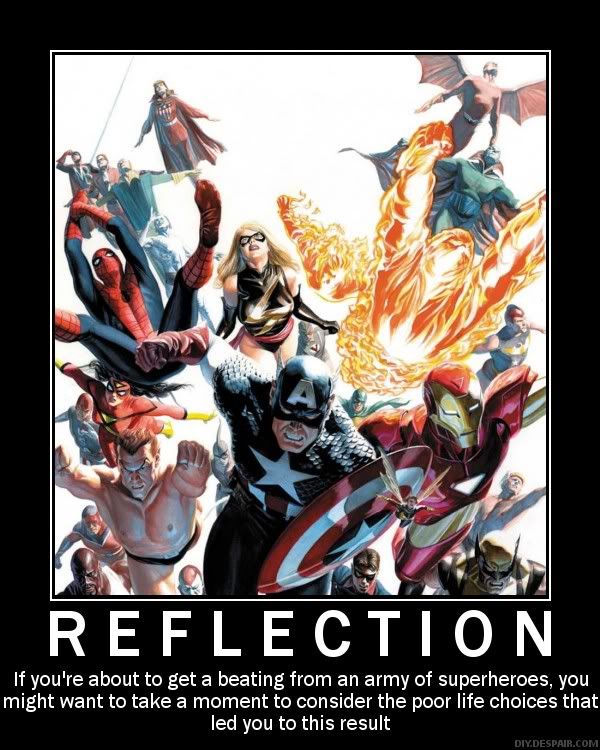 Yes, I know this sounds like a bad joke, but hear me out. What a media outlet wants more than anything is new content generated for them to profit from, and that's something that can be found in spades in on the internet. Whether it is the webcomics which create new content and possesses a natural talent pool of creators who know not only some of the storytelling fundamentals, but are familiar with the challenges of getting an audience in a post-internet universe, to talented amateurs (paging Mr. Chris Bird, of course). I think we're going to see the internet open up as a new talent hunting ground in this decade, because it's necessary.
Yes, I know this sounds like a bad joke, but hear me out. What a media outlet wants more than anything is new content generated for them to profit from, and that's something that can be found in spades in on the internet. Whether it is the webcomics which create new content and possesses a natural talent pool of creators who know not only some of the storytelling fundamentals, but are familiar with the challenges of getting an audience in a post-internet universe, to talented amateurs (paging Mr. Chris Bird, of course). I think we're going to see the internet open up as a new talent hunting ground in this decade, because it's necessary.See, here's the bigger thing: comic companies don't know what the hell kind of trouble their industry is really in. Go to a bookstore, and compare the manga shelves with the "graphic novels" section that has Marvel, DC, Dark Horse Image and etc etc. The Manga shelves are clean, uniform and easy to find things with. The Graphic novel sections is chaos incarnate where a non-fan would get lost without a roadmap. And let's not forget things like online shopping and marketing, where the comic companies are silent. It's an unexplored (and mature) frontier that comics are nearly entirely absent from, and if that doesn't change, it doesn't matter what stories are being produced because no one will be reading them.
Labels:
Avengers,
Captain America,
Hawkeye,
Iron Man,
Marvel Comics,
motivational posters,
Nick Fury,
Rants,
Spider-Man
Thursday, February 04, 2010
Wednesday, February 03, 2010
Subscribe to:
Comments (Atom)
